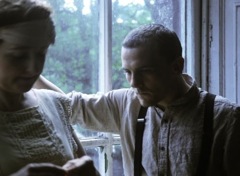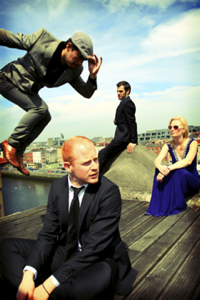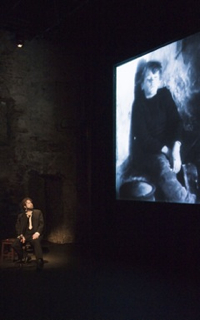Irish theatre-makers are increasingly directing their attention to theatre as an instrument – one little to be trusted at that – and in 2010, there is no longer a question about whether Irish audiences are up for it. You have only to look to a moment where the performers in Theatreclub Stole Your Clock Radio What the Fuck You Gonna to Do About it? quote what is evidently an extended film sequence (December 2009, revived Project Arts Centre, May 2010). It takes a minute to realise that it’s The Breakfast Club (but of course), another to realise that certain audience members are openly quoting along with them. This is not a send-up of the film, but a moment where performers and audience collectively send-up themselves: privacies are laid bare – yes, this film was a rites-of-passage for me too. No, couldn’t care less for a Self Aid concert myself. That kind of 80s? Morto. It is a supreme moment of self-consciousness and one which theatre’s aura – the sense that what-they-do-up-there-is-magic – cannot survive.
An instrumental theatre is one self-consciously played by performers and audiences alike – recognitions are, for the most part, mutual recognitions (what, after all, is there to reveal?) – and the stage-audience split approaches its dissolution. It is one where everything is quoted and the quote is shared by everyone in the room. It is one where the ghosts of past performances crowd in.
Step in to Pan Pan’s The Rehearsal: Playing the Dane(Ulster Bank Dublin Theatre Festival, 2010) directed by Gavin Quinn, designed by Aedín Cosgrove; turn any corner, you see Hamlets past at every turn. And of course, Pan Pan are right, you’ve seen Hamlet before, even if you haven’t. Here is theatre as iTunes library. Choose your Hamlet, let your mood be your guide.
With such a premise, you might feel theatre-makers are off the hook, but what comes in its wake, paradoxically, is a redrawing of limits. Have untrained secondary-school students step in as performers, make of Ophelia’s death and funeral the play-within-the-play, strike in both Hamlet and Endgame a common rank chord, the affectation, “the ham acting”, that shadows any attempt to make it new, to think it anew. Pan Pan presents the audience with a menu, sure, but free themselves up, as a consequence, to make work that abounds with ideas.
In addressing theatre as instrument, Irish theatre-makers show sensitivities in several directions:
They refrain from trading in illusion: the question of bridges.
 Anu Productions’s World’s End Lane (Absolut Fringe 2010), directed by Louise Lowe, shed light on the sex-trade in Dublin’s Night-town, or Monto, pre-1925. At no point, however, was the era “recreated”. Rather audiences, in a piece of intimate theatre, had to make equivalent decisions to those of a sex-trade situation. And such was the experience for audiences, such was the weight with which those decisions were felt, that a more menacing and categorical bridge to the era, and to the realities of sex-trading generally, could hardly have been made.
Anu Productions’s World’s End Lane (Absolut Fringe 2010), directed by Louise Lowe, shed light on the sex-trade in Dublin’s Night-town, or Monto, pre-1925. At no point, however, was the era “recreated”. Rather audiences, in a piece of intimate theatre, had to make equivalent decisions to those of a sex-trade situation. And such was the experience for audiences, such was the weight with which those decisions were felt, that a more menacing and categorical bridge to the era, and to the realities of sex-trading generally, could hardly have been made.
They refrain from privileging the main story: the question of lightning rods.
Playgroup’s Berlin Love Tour (Absolut Fringe 2010), written by Lynda Radley and directed by Tom Creed, brought us round the chief historical sites of Berlin. In the course of this tour, a tour guide, performed by Hilary O’Shaughnessy, shared with us a personal account of a romance that owed its very texture and shape to this Berlin setting. We were given precise architectural accounts of the Berlin monuments and buildings we were looking at. In some ways, it was an unremarkable tour such as any tourist might wish to have in a new city. Except it was referred at all times to its Dublin backdrop. And the effect, thereby, of theatre as a lightning rod for a thousand other stories, those we carelessly fail to register on any teeming Dublin evening, for instance, recast our guide as a modern day Scheherazade.
Yet, apart from O’Shaughnessy’s – and Damian Kearney’s reappearing busker – no story was organised. The night I took the tour, two young muslim men were keeping to themselves at a point along our path. The recognition of our mutual oddness, and then of our mutual dumbness – I mean, how could we explain ourselves to the other? – passed through us all like an electric current. Then something ordinary but shattering was transacted in the gentlest of intermingling manoeuvres: a silent agreement to leave the other to their mystery. There were smiles all round. I desperately wanted to believe these young men clandestine lovers. But it was impossible to tell. In the end, being unmistakably in the company of others’ stories, Berlin’s, O’Shaughnessy’s, Kearney’s, these young men, the countless others of that Dublin evening, it sharpened our consciousness of our own, and I felt Dublin to be a European city as never before and myself intimately linked to Europe through it.
They expand on what counts as text: the question of frames.
Una McKevitt’s work is marked by a keen instinct for the fecundity of available text. And the more she goes in its pursuit, the more she discovers in text its sensuous values. Her work is shifting theatre instinctively along an axis from sense to sensuality. Text is not just the words spoken, but the music – cadence, pitch, tonal qualities – of that utterance. Not alone the music, but the movements, gestures, signatures of “non-professional” performers – as they are, for the most part, with her work – in space and time. Not alone signatures of her performers, but of audience members summoned to stand, so to speak, alongside them by virtue of their witness. McKevitt evidently loves to read people.
.jpg.aspx) The spare design she favours would appear, however, to answer to a different impulse: to keep each text distinct, to hold back from supporting one text above all others. You might say her theatre consists in teasing into the open the manifold text-scapes of performers, sound and space, and momentarily holding them together in unique combinations. Victor and Gord (Dublin Fringe 2009; revived, Project Arts Centre, February 2010) took two young women, friends in childhood, perhaps less so as adults, and put them through what must be described as rhetorical tasks. She then further struck a distance between them and herself by concentrating on the unfolding of each as rhythm. She has, over time, introduced other people into the piece, and the effect has been to amplify rather than dilute what she has already achieved.
The spare design she favours would appear, however, to answer to a different impulse: to keep each text distinct, to hold back from supporting one text above all others. You might say her theatre consists in teasing into the open the manifold text-scapes of performers, sound and space, and momentarily holding them together in unique combinations. Victor and Gord (Dublin Fringe 2009; revived, Project Arts Centre, February 2010) took two young women, friends in childhood, perhaps less so as adults, and put them through what must be described as rhetorical tasks. She then further struck a distance between them and herself by concentrating on the unfolding of each as rhythm. She has, over time, introduced other people into the piece, and the effect has been to amplify rather than dilute what she has already achieved.
Such are the possibilities of her form, McKevitt looks to have only got started. In 565+ (Ulster Bank Dublin Theatre Festival 2010) she finds a self-reflexive potential for performance in the avidity of her aunt’s theatre-going: Marie O’Rourke has seen more than 565 performances in seven years; she believes theatre has saved her life. McKevitt once again insists on a distance between form and confession. However, here the point of interest is the combinations of story blocks – for each performance the ordering of the story is remade – and we discover ourselves seeing with our ears, listening with our eyes to the text of Marie.
Most recently, in The Big Deal (Queer Notions, Project Arts Centre, December 2010) McKevitt takes the diary of a transgender individual, written in the days leading up to and following her sex reassignment surgery, and breaks it up between two stand-in female performers. Here, testimony lives independently of the performers, yet takes on a human weight owing to their mediation of it. It is perilously without affect, yet the utterance of a line, “this morning [the morning following surgery] what defines me, above all else, is that I love my wife”, or the physical appearance of a letter, has the power to make me fearful of what theatre does, all over again.
Spontaneity is a whole other value in their work: the question of sprung floors.
 Such are the vertiginous, collapsing, high-wire forms already distinguishing the work of The Company – Who is Fergus Kilpatrick? (Dublin Fringe 2009; revived, Project Arts Centre, April 2010); As You Are Now So Once Were We(Absolut Fringe 2010) – forms folding in on themselves, getting pulled from under your feet, throwing you back on the fabrication of the “now” – we could be forgiven for thinking narcissism their theme. We should know better, though, than either to underestimate narcissism as theme, or fail to recognise the melancholy undertow to their work. Sure, how precisely they strike out for form as content, content form. How effortlessly they infect us with their jouissance. Yet, who’d have thought they’d make manifest such a melancholy, a nostalgia for meaning?
Such are the vertiginous, collapsing, high-wire forms already distinguishing the work of The Company – Who is Fergus Kilpatrick? (Dublin Fringe 2009; revived, Project Arts Centre, April 2010); As You Are Now So Once Were We(Absolut Fringe 2010) – forms folding in on themselves, getting pulled from under your feet, throwing you back on the fabrication of the “now” – we could be forgiven for thinking narcissism their theme. We should know better, though, than either to underestimate narcissism as theme, or fail to recognise the melancholy undertow to their work. Sure, how precisely they strike out for form as content, content form. How effortlessly they infect us with their jouissance. Yet, who’d have thought they’d make manifest such a melancholy, a nostalgia for meaning?
Theatreclub shamelessly embrace the impossibility to originate – the “false starts”, the rip-offs of cinema, TV, music videos, the speaking in tongues, the art of attitude – it’s a self-conscious punk aesthetic but more ironical, tuned-in and committed. Here, too, is a gift for spontaneity, an insistence on taking the world on their own terms, a sophistication towards theatrical form that comes astonishingly as second-nature. Precisely because they turn their back on it all, they somehow mark themselves out – with The Company, You Can Call Me Frances, and Ponydance – as the more likely inheritors of theatre on this island. Such an inheritance may not interest them, but you somehow feel it’s theirs.
Performance as loss rehearses more momentous losses: the question of yardsticks.
Brokentalkers’ The Blue Boy (work-in-progress, Ulster Bank Dublin Theatre Festival 2010) takes the Ryan Report as its starting point. One of its co-directors, Gary Keegan, recalls his mother (?) – the daughter of an undertaker, in any case – speak of her father’s measuring out coffins with folding rulers for those children who died while in institutional care. Later we see repetitive movements, young dancers charged with ill-fitting compulsions and traumas, a concrete physical language evocative of pain. Nothing here is illustrative of institutional work, but its force is unmistakably present. You have to pay attention to notice the attrition in the dancers, but once you do, it clings to you like an accusation. Only in such circumstances as these do you realise, it is the light from the furthest stars that terrifies, stars already dead by the time their light reaches you.
 That a film might enclose a critical perspective within itself is largely absent from O’Flaherty’s Man of Aran; it is precisely what Paul Keogan brings to it in performance (Once-off Productions, Druid Theatre, December 2010). In Man of Aran Re-Imagined, Keogan shows himself, here, to be a creative impresario of a caliber the island seldom sees. He commissions new music, soundscape and written commentary. With Liam O’Maonlaí as his channel, his saoí, he then creates something sui generis, a melding of live performance and silent film, history and myth, speech and song, live vocal commentary in the Irish language and recorded quotation in English. Man of Aran is for most of us a reputation before it is a film. Keogan restores it as a film and brings home what risks were taken to make it. He so awakens the malignancy and terror dormant in the film that loss becomes the very sting in its tail. Film and performance eventually hit home with the force of a restored memory and the realisation of an irrecoverable past.
That a film might enclose a critical perspective within itself is largely absent from O’Flaherty’s Man of Aran; it is precisely what Paul Keogan brings to it in performance (Once-off Productions, Druid Theatre, December 2010). In Man of Aran Re-Imagined, Keogan shows himself, here, to be a creative impresario of a caliber the island seldom sees. He commissions new music, soundscape and written commentary. With Liam O’Maonlaí as his channel, his saoí, he then creates something sui generis, a melding of live performance and silent film, history and myth, speech and song, live vocal commentary in the Irish language and recorded quotation in English. Man of Aran is for most of us a reputation before it is a film. Keogan restores it as a film and brings home what risks were taken to make it. He so awakens the malignancy and terror dormant in the film that loss becomes the very sting in its tail. Film and performance eventually hit home with the force of a restored memory and the realisation of an irrecoverable past.
While it wasn’t so much the work but the development each represents that has interested me for this article, nonetheless, it remains to be said: there is much else I didn’t see that might well have been included here. I can only hope much of this work is revived in 2011 – along the lines of the revivals of 2010 (an unintended leitmotif in this overview). Respecting revivals and new work alike, if I might wish them every success.
Thomas Conway is Literary Manager with Druid Theatre Company.
In our end-of-year review series, read Peter Crawley:‘The Year of Living Differently’ and Patrick Lonergan: ‘A Dance into the Unknown’.